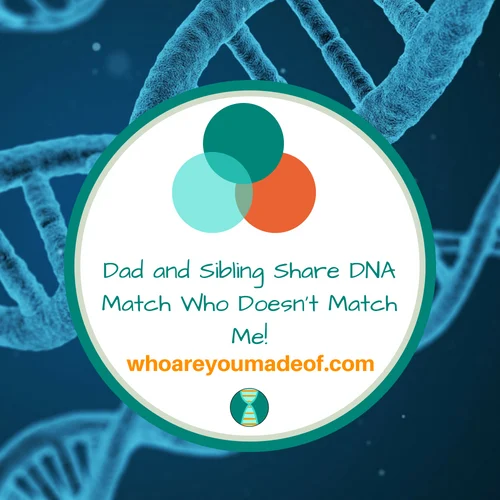If you have found that your parent and sibling have a DNA match that doesn't match you, are you wondering how this could be? In this post, I'll explain how it can be possible that your dad (or mom!) and sibling can have a DNA match that you don't have.
Here's a hint: It doesn't mean that your results are wrong, or that there is anything shady going on.

So often, I get questions from people wondering why their mom shares, say, 100+ cMs (centimorgans) and their sister shares 30 cMs with a match that doesn't match the person asking the question.
They wonder if this is proof that this whole DNA testing thing doesn't work, or if it means that they aren't as related to their mother and sister as they should be.
Autosomal DNA (the kind that they test for Ancestry DNA, My Heritage DNA, etc) is very reliable. It's also straightforward in many ways, but there are some nuances that can be confusing at times - especially when you see situations like the once that I describe above.
Below are several explanations that will give you a better idea as to how DNA is inherited, and could possible explain why your parent and sibling have a match when you don't - assuming you have verified via your DNA matches that you do, indeed, share the expected amount of DNA with your sibling and parent.
We don't share DNA with all of our relatives
It seems as if we should share DNA with all of our relatives, but we don't. We share DNA with all of our close relatives, many of our more distant relatives, and only some of our very distant relatives. The reason that this is is because of the way that DNA is inherited - we only get 50% of each of our parent's DNA.
Going along with the example we are using in this post, if there is a match (let's call her Sally) that matches your mom and sister and not you, it means that the 50% of the DNA that you got from your mom doesn't include the segments that would match Sally.
Your sister inherited 50% of her DNA from your mom, too, but she didn't get the same exact 50% that you did. Much of the DNA that your sister got from your mom does overlap with yours, but not all of it.
I wrote a fairly detailed post on this topic, just in case you are interested in reading more about why we don't share DNA with all of our relatives.
The more distant the cousin, the less chance that two siblings will match
We'll always share DNA with our siblings, our parents, aunts, uncles, grandparents, great-grandparents, first cousins, and second cousins - and all of our other relatives that are similarly related.
By the time we get to third cousins, though, there is about a 10% chance that they won't match us. If Sally is your parent's third cousin, or someone who seems to be related at this distance, it's likely that both you and your sibling will match - but it's also possible that you won't.
The reason that it's probable that both you and your sibling will match Sally is because of chance, and then number of DNA segments that your parent likely shares with this third cousin.
While it's possible that your parent shares only a small amount and only one segment with their third cousin, chances are good that they share more than one DNA segment with their third cousin and that these segments are fairly long.
If this is the case, then it increases the odds that when you and your sibling inherited 50% of your parent's DNA, that you will inherit at least a small DNA segment that matches their third cousin (your third cousin once-removed).
The more distant the cousin to your parent, however, the smaller amount of DNA that they will share with them. For example, it would be completely normal for your parent to share a 25 cM segment with a fourth cousin.
When you and your sibling inherited your DNA from this parent, there are high odds that one of you wouldn't inherit this relatively small segment and won't match this fourth cousin once-removed. The smaller the segment, the smaller the chance that you inherit it.
One sibling not matching helps narrow down relationship possibilities
Believe it or not, the fact that your sibling matches and you don't helps you narrow down relationship possibilities. If your parent and sibling match Sally and you don't, you can be sure that the DNA match is not an exact second cousin to either you or your sibling.
It's also very unlikely that they are a second cousin once-removed, which means that you can feel pretty confident that you should be looking for a most recent common ancestor (MRCA) at least as far back as their great-grandparents, and possibly great-great grandparents.
You can't be sure about the exact relationship until you compare both of your family trees, of course.
Conclusion
I hope that this post helped you understand how it can be possible for you, your parent, and your sibling to have DNA matches that are not shared among both (or all!) siblings.
If you have any questions about something that you read here, or would like to share your own experience about DNA matches that you and your sibling don't share, but that match your parent(s), I would love to hear from you in the discussion below.
Thanks for stopping by!
